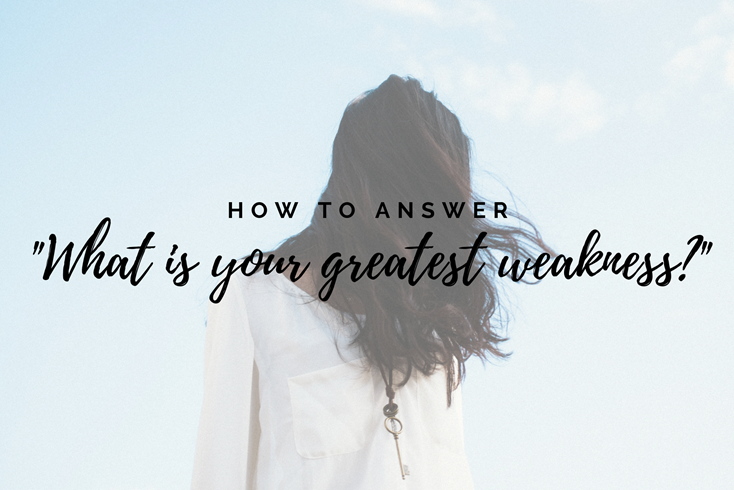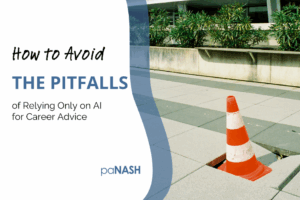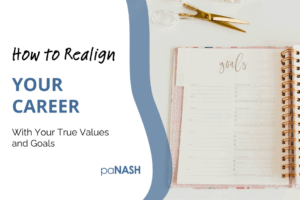|
|
It’s the interview question every job candidate dreads: “What is your greatest weakness?”
And there’s been a lot of bad advice out there telling candidates they should say things like,
“I’m too much of a perfectionist.”
Or,
“I work too hard.”
I call bullsh*t. And so does the interviewer who’s heard the same canned answer from every other candidate!
In fact, if you respond with anything like the above answers, you’ll likely not be considered for the job. Instead, your interviewers will think you’re being dishonest with your answer. Then, they’ll question your honesty for all your other answers.
You can’t give a canned answer to this question.
And you also can’t evade the question.
Why you can’t evade the “What’s your greatest weakness?” question.
I remember in my first professional job my supervisor Nicolette and I had to conduct interviews to fill a position similar to mine. She and I interviewed one candidate I will never forget.
When Nicolette asked the candidate what her greatest strength was she immediately had an answer. But when asked what her greatest weakness was, she feigned the inability to think of anything at all. It was as if she never expected this question.
The candidate kept staring down with her eyebrows furrowed like she was trying hard to think but couldn’t come up with anything. She wouldn’t give an answer and asked if she could pass on the question and come back to it later, probably thinking Nicolette would forget. She didn’t.
When Nicolette later came back to the question, the candidate did the same thing. She sat silently with that “thinking hard” look on her face. Nicolette had no problem waiting through the awkward silence. It was like they were playing chicken to see who would speak first!
I don’t think the candidate ever did answer the question. We eventually ran out of time and had to begin the next part of her interview, a presentation she had to give to the rest of the search committee.
I remember how frustrated Nicolette was with the candidate afterward. She said to me, “Everyone has weaknesses! She should’ve been able to answer the question with something!” This left a bad taste in Nicolette’s mouth.
The candidate did some other things in her presentation which knocked her out of the running for the position, but her evasion of the question “What is your greatest weakness?” was the beginning of the end for her.
How to appropriately answer “What’s your greatest weakness?”
So if you can’t avoid the question or give a BS answer to “What are your greatest weaknesses?,” how do you answer it without putting yourself in a negative light?
There is a way! Here’s how:
1. Understand why it’s being asked.
First, it’s important to consider why the interviewer might ask this question. It’s not always to try to trick you or to try to make you look bad.
Sometimes the employer needs to know what kind of support or training you might require when first hired.
2. Listen to the question.
Second, listen to the question and answer it the way it’s being asked. If the interviewers only ask for one weakness, only give one. If they ask for weaknessES (plural), then show you can follow directions, but only give two!
(Believe me, this is not the time to start making a laundry list of your negatives!)
3. Avoid canned answers!
Third, do NOT give a canned answer like the ones above.
Just don’t.
Ever!
4. Never negate your strengths!
Fourth, do NOT give the same answer you gave for the greatest strengths question. I actually see people doing this all the time. They’ll begin their answer with,
“Well sometimes my strength is my weakness because…BLAH, BLAH, BLAH.”
The last thing you want to do is negate your strengths!
5. Never answer with a trait.
Fifth, do NOT give a personality trait as your answer.
Why? Because traits are ingrained and are difficult to change.
Instead, give a SKILL since skills can easily be learned.
No one person possesses every skill, so you probably have a few examples to choose from, allowing you to answer honestly.
Just make sure it’s not a skill heavily required for the job. Instead use one only slightly related to the job.
6. Follow up with a positive.
Sixth, once you briefly give your answer, then follow up with a positive on how you’re either trying to overcome your weakness or how you’re able to compensate for it.
An example would be if you aren’t good at Excel and you won’t be required to use it much in the job. Here’s how you might word this:
“While I have experience in using MS Excel, I’m not as well-versed in the more advanced features of the program. Therefore, I’m currently taking an online tutorial to familiarize myself with Excel’s advanced functions so I can use it more fully if necessary.”
Always make sure whatever example you use for your answer is an honest one that doesn’t have too negative of an impact on your candidacy for the job.
More interview help.
There are other common interview questions just as challenging as the question, “What are your greatest weaknesses?” For example:
- Can you tell us about yourself? (This one is never as easy as you it sounds!)
- What are your greatest strengths? (There is also a method to answering this question you should know!)
- Can you tell me about a time when…?
- Why should we hire you?
- And tons more!
I teach you appropriate ways to answer each of these questions in my on-demand program Steps to Acing the Interview and Reducing Your Interview Anxiety.
The program also includes:
- Strategies to give you the confidence to overcome the fear and stress of interviewing.
- What you’ve been doing wrong in past interviews and how to correct it.
- The best and most productive way to prepare for your next interview.
- Questions YOU should ask in the interview.
- How to win the interview in each stage: before, during, and after.
I encourage you to check it out well in advance of any upcoming interviews so you’ll have time to prepare the best possible answers and land the job offer!
Related posts:
- 16 Embarrassing Job Interview Mistakes That Will Make You Look Unprofessional
- What You Need to Know About Job Interviews of the Modern Era
- How to Know When It’s Time to Get Career Help






